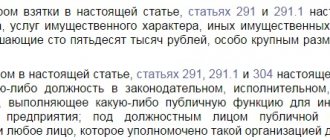New edition of Art. 330 of the Criminal Code of the Russian Federation
1. Arbitrariness, that is, unauthorized, contrary to the procedure established by law or other normative legal act, the commission of any actions, the legality of which is disputed by an organization or a citizen, if such actions caused significant harm, -
shall be punishable by a fine in the amount of up to eighty thousand rubles, or in the amount of the wages or other income of the convicted person for a period of up to six months, or by compulsory labor for a term of up to four hundred eighty hours, or by corrective labor for a term of up to two years, or by arrest for a term of up to six months.
2. The same act, committed with the use of violence or with the threat of its use, -
shall be punishable by forced labor for a term of up to five years, or arrest for a term of up to six months, or imprisonment for a term of up to five years.
Criminal and administrative punishment for arbitrariness
In addition to criminal liability, administrative punishment is provided for arbitrariness under Article 19.1 of the Code of Administrative Offenses of the Russian Federation. It is less strict and is issued in cases where the criminal acts did not cause significant harm to individuals or legal entities. If the damage was significant or the actions of the attacker posed a danger to society, then Article 330 of the Criminal Code of the Russian Federation is applied.
Having assessed the scale of the crime, the investigator decides whether to initiate an administrative or criminal case. Subsequently, the collected materials are transferred to the court, which imposes punishment on the culprit. If there is insufficient evidence or there is no corpus delicti in the committed actions, the consideration of the case is terminated.
Administrative responsibility for arbitrariness
Only individuals and officials can be held accountable under Article 19.1 of the Code of Administrative Offences. If arbitrariness was committed by a legal entity, then the investigator initiates a criminal case, regardless of the scale of the criminal activity.
The Code of Administrative Offenses of the Russian Federation provides for the following penalties for arbitrariness:
- Warning. This measure is applied if the offense is committed for the first time and does not have serious consequences. Most often, the culprit gets off with a warning when the parties manage to reach an agreement.
- An administrative fine of 100-300 rubles. This punishment applies to citizens.
- The fine for officials is 300-500 rubles.
Criminal liability for arbitrariness
Punishment for arbitrariness under the Criminal Code of the Russian Federation can range from a fine to imprisonment. The maximum prison term is 5 years. This preventive measure is chosen in the following cases:
- the offender’s actions caused significant damage;
- violent actions were used against the victim.
In most cases, the attacker receives a fine. Less often, the culprit is sentenced to 6 months of arrest or correctional labor.
Another comment on Art. 330 of the Criminal Code of the Russian Federation
1. The objective side is characterized by the unauthorized commission of any actions, the legality of which is disputed by an organization or a citizen. Arbitrariness means that actions are carried out contrary to the procedure provided for by law or other regulatory legal act. The legality of actions can be challenged by any organization or individual in a claim, administrative, judicial or other manner.
2. The crime is completed from the moment significant harm is caused (for example, disorganization of the activities of any body, institution, organization, violation of the constitutional rights of citizens, etc.).
3. The qualifying feature (Part 2) is the use of violence or the threat of its use. Violence may consist of beating the victim, restricting his freedom, causing him other physical pain or minor harm to health. The threat of violence can be of any kind and can be expressed in a mental impact on the victim, up to and including a threat of murder.
Features of judicial practice
The main task of the court when considering cases of arbitrariness is the correct qualification of the crime. This criminal act has a number of common features with other crimes. Therefore, arbitrariness is often confused with similar articles that determine punishment for an attempt on someone else’s property.
If there is insufficient collection of evidence, arbitrariness can be regarded as ordinary theft. For example, a citizen contacted the police, accusing a neighbor of stealing his great-grandmother’s diamond ring, which was a family heirloom. A criminal case was opened into the theft, which was later reclassified as arbitrariness.
The fact is that the victim hid from law enforcement some information directly related to the case. A year ago, he borrowed a large sum of money from a neighbor, promising to pay him back within two months. Without waiting for a refund, the neighbor demanded payment of the debt. This was followed by a series of promises, which ultimately forced the citizen to take extreme measures. Once again, arriving at the borrower’s apartment, he took an antique ring from the shelf, promising to return it when he paid off the debt.
The victim passed off the incident as an ordinary theft. As a result, the culprit returned and received a fine for arbitrariness.
In order to accurately qualify an act as arbitrariness, it is necessary to pay attention to the motive of the crime. Acting arbitrarily, a citizen tries to restore his rights by breaking the law, often resorting to violence.
In most cases, law enforcement agencies and courts forget that such crimes provide not only criminal, but also administrative liability. As soon as they learn about the fact of arbitrariness, investigators open criminal cases, trying to collect maximum evidence of the criminal’s guilt. Subsequently, the judge chooses punishment in the form of a fine, but its amount is quite large by the standards of the Russian Federation.
As a result of such actions, it turns out that the severity of the punishment is disproportionate to the crime committed. Therefore, the Supreme Court constantly reminds judges that they should be more careful in cases of arbitrariness. It is extremely important to distinguish minor offenses that arose on everyday grounds from truly malicious violations of legal norms, which can and should be brought under a criminal article.
Many judges forget that a citizen can be held criminally liable only if there is significant damage. Punishment under the Criminal Code of the Russian Federation for arbitrariness that occurred as a result of a domestic quarrel is in most cases unlawful and is subject to challenge in a higher court.
Thus, the main problem of modern judicial practice is the separation of arbitrary actions subject to administrative punishment from criminal offenses. To do this, it is necessary to clearly define the concept of significant damage. At the moment this term is not fixed at the legislative level. Neither the specific amount of significant damage nor the associated negative consequences have been established. Therefore, when determining the extent of harm, the judge is guided by his own considerations.
Article 330. Arbitrariness
Appeal ruling of the Judicial Collegium for Criminal Cases of the Supreme Court of the Russian Federation dated October 3, 2018 N 4-APU18-35 lawyer Tushmalov I.O. in the interests of the convicted Popov S.D. claims that the evidence examined at the trial established the fact that Popov demanded his money from the victim G. He refers to the recordings of telephone conversations between the convict and M., as well as to the recordings of the voice recorder seized from the latter, from the contents of which he concludes that part of the money - at least 30 million - belonged to Popov. He disputes the presence of an organized group and the organizational role of Popov in detaining G. He claims that the rest of the convicts moved G. without his knowledge, that is, there was an excess of the performers. Considers the testimony of the victim G. to be unacceptable evidence, since they are based on assumptions. He draws attention to the evidence confirming, in his opinion, that G. embezzled the money and disappeared, and Popov was looking for him for a long time. Indicates that the convicted person, for a reward, involved Tushin in the search for G., and Tushin - other convicts in the case, who did not know about G.’s debt. After finding the victim, they placed him in an apartment, through him they contacted M., the brother of G.’s wife, who was in charge of the stolen money, and demanded that they return it, to which he agreed, but upon receiving money in the amount of 30 million rubles. Popov was detained by police officers. Challenges the creation and leadership of an organized criminal group by the convicted person. He asks that the sentence regarding the conviction for kidnapping the victim be reversed and the case dismissed, and that the sentence regarding the conviction for extortion be changed and his actions be reclassified under Art. 330 of the Criminal Code of the Russian Federation;
Resolution of the Presidium of the Supreme Court of the Russian Federation dated October 17, 2018 N 101P18
By the verdict of the Oktyabrsky District Court of the city of Ufa of the Republic of Bashkortostan dated September 1, 2010, Mulyukov R.M. convicted under Part 3 of Art. 159 of the Criminal Code of the Russian Federation to imprisonment for a period of 4 years with a fine of 5,000 rubles, under Part 3 of Art. 159 of the Criminal Code of the Russian Federation - to imprisonment for a period of 4 years 6 months with a fine of 6,000 rubles, under Part 3 of Art. 159 of the Criminal Code of the Russian Federation - to imprisonment for a period of 5 years with a fine of 7,000 rubles, under Part 3 of Art. 159 of the Criminal Code of the Russian Federation - to imprisonment for a period of 4 years 6 months with a fine of 8,000 rubles, for committing two crimes under Part 4 of Art. 159 of the Criminal Code of the Russian Federation - to imprisonment for a period of 6 years with a fine of 500,000 rubles for each, under Part 2 of Art. 159 of the Criminal Code of the Russian Federation - to imprisonment for a period of 2 years. Based on Part 3 of Art. of the Criminal Code of the Russian Federation for the totality of crimes, by partial addition of punishments, finally Mulyukov R.M. sentenced to 8 years of imprisonment to be served in a general regime correctional colony, with a fine of 550,000 rubles. For committing crimes under Part 1 of Art. 330, part 2 art. 325 of the Criminal Code of the Russian Federation, Mulyukov R.M. exempted from punishment in accordance with Art. of the Criminal Code of the Russian Federation due to the expiration of the statute of limitations.
Appeal ruling of the Judicial Collegium for Criminal Cases of the Supreme Court of the Russian Federation dated November 15, 2018 N 33-APU18-13SP
In the appeals, the convicted Fursov V.L. and lawyer Pavlov A.B. in his defense they express disagreement with the verdict, due to the incorrect application of the criminal law and the severity of the punishment. The convicted Fursov, with reference to the Resolutions of the Plenum of the Supreme Court of the Russian Federation, believes that his actions constitute the elements of Art. 330 of the Criminal Code of the Russian Federation, and therefore requests re-qualification. The lawyer believes that Fursov’s conviction under Art. 102 of the Criminal Code of the RSFSR does not create a particularly dangerous recidivism, since this crime is classified as serious. Please note that the sentences for the sentences of August 9, 1999 and November 17, 2000 were served on October 1, 2009; Fursov was released from punishment under the verdict of April 9, 2015 under an amnesty decree, and, consequently, his criminal record was expunged. In connection with the above, he asks to change the sentence with a reduction in the punishment, with the definition of a strict regime. At the hearing of the court of appeal, he additionally indicated that the recovery from him in favor of A. for compensation of material damage (expenses for a representative) was unfounded.
Resolution of the Presidium of the Supreme Court of the Russian Federation dated December 12, 2018 N 209P18
Batalov Alexander Nikolaevich, ... convicted: December 8, 2004 under Part 2 of Art. 213, part 2 art. 116, paragraph “a”, part 2, art. 161, part 3 art. 162 of the Criminal Code of the Russian Federation, taking into account the changes made to the sentence by the decision of the Presidium of the Chelyabinsk Regional Court dated October 19, 2005, to 7 years in prison; December 30, 2004 under Part 1 of Art. 213, part 2 art. 330 of the Criminal Code of the Russian Federation, on the basis of Part 2 of Art. of the Criminal Code of the Russian Federation to 4 years in prison, -
Cassation ruling of the Judicial Collegium for Criminal Cases of the Supreme Court of the Russian Federation dated August 22, 2019 N 49-UD19-14
- December 4, 2007 under Part 2 of Art. 330 of the Criminal Code of the Russian Federation to 3 years 6 months of suspended imprisonment with a probationary period of 2 years, - November 2, 2010 under Part 2 of Art. 167, Criminal Code of the Russian Federation to 4 years in prison, released on February 8, 2013 after serving the sentence,
Appeal ruling of the Judicial Collegium for Criminal Cases of the Supreme Court of the Russian Federation dated August 22, 2019 N 33-APU19-16
- according to Part 2 of Art. 330 of the Criminal Code of the Russian Federation (in relation to the victim K.) to 2 years in prison; - according to Part 2 of Art. 167 of the Criminal Code of the Russian Federation (in relation to S.’s car) to 2 years in prison; - according to paragraphs “e”, “h”, part 2 of Art. 112 of the Criminal Code of the Russian Federation to 3 years in prison;
Appeal ruling of the Judicial Collegium for Criminal Cases of the Supreme Court of the Russian Federation dated July 16, 2019 N 89-APU19-6
convicted under Part 2 of Art. 330 of the Criminal Code of the Russian Federation (for arbitrariness in relation to S.) to 3 years in prison, under paragraph “a”, part 2 of Art. 163 of the Criminal Code of the Russian Federation (for extortion from Yu.) to 5 years in prison, under paragraph “c” of Part 3 of Art. 158 of the Criminal Code of the Russian Federation (for theft of D.’s property) to 4 years in prison, under Part 3 of Art. 159 of the Criminal Code of the Russian Federation (for fraud against Ya.) to 4 years in prison, under clauses “a”, “c”, part 2 of Art. 163 of the Criminal Code of the Russian Federation (for extortion from V.) to 5 years in prison, under Part 2 of Art. 162 of the Criminal Code of the Russian Federation (for robbery on K.) to 7 years in prison, under Part 3 of Art. 159 of the Criminal Code of the Russian Federation (for fraud against LLC “E.” IP K.) to 5 years in prison, under Part 4 of Art. 159 of the Criminal Code of the Russian Federation (for fraud against P. LLC) to 6 years in prison, under Part 5 of Art. , paragraphs “g”, “k”, part 2 of Art. 105 of the Criminal Code of the Russian Federation to 8 years in prison with restriction of freedom for a period of 1 year 6 months.
Appeal ruling of the Judicial Collegium for Criminal Cases of the Supreme Court of the Russian Federation dated November 6, 2019 N 46-APU19-12sp
lawyer Karachanskaya notes the incorrect application of the criminal law by the court and the excessively harsh punishment imposed on the convicted Sharapov; in her opinion, the jurors were unable to determine which of the convicts inflicted bodily injuries on the victims that resulted in death; draws attention to the fact that no one detained the victims either at the scene of the fight or in Tyutin’s house, and therefore Sharapov’s actions should be reclassified from Art. 126 part 2 clauses “a”, “c”, “g” of the Criminal Code of the Russian Federation at Art. 330 part 2 of the Criminal Code of the Russian Federation; the presiding officer gave incorrect explanations to the jurors regarding the contradictions in the question paper, which resulted in an incorrect verdict; the unlawful behavior of the victims, which was established by the jury, was unreasonably not recognized as a mitigating circumstance; The amount of compensation for moral damage recovered in favor of the victims was determined without taking into account Sharapov’s financial situation. Asks to qualify Sharapov’s actions under Art. Art. 330 part 2 and 109 part 1 of the Criminal Code of the Russian Federation and impose a fair punishment;
Resolution of the Presidium of the Supreme Court of the Russian Federation dated September 25, 2019 N 86P19
By the decision of the judge of the Pervomaisky District Court of Kirov dated June 1, 2006 in relation to Denis Borisovich Kolomensky, ... accused of committing crimes under Part 3 of Art. 160, part 1 art. 330 of the Criminal Code of the Russian Federation, a preventive measure was chosen in the form of detention.
Determination of the Constitutional Court of the Russian Federation dated November 23, 2017 N 2769-O
Part one of Article 330 of the Criminal Code of the Russian Federation provides for liability for arbitrariness, i.e. unauthorized, contrary to the procedure established by law or other regulatory legal acts, the commission of any actions, the legality of which is disputed by an organization or a citizen, if such actions caused significant harm. This norm, considered in unity with the provisions of the General Part of the Criminal Code of the Russian Federation (Articles 5, 8, part one of Article 14 and Article 25), implies criminal liability only for the actions specified in it and only when the person was aware of their willfulness, not based on the law and wanted to implement them, foresaw the possibility or inevitability of consequences in the form of significant harm, wanted them to happen or did not want them, but consciously allowed these consequences or was indifferent to them. Consequently, there is no basis for the conclusion that the said norm contains uncertainty, as a result of which a person is deprived of the opportunity to realize the illegality of his actions and foresee the onset of responsibility for their commission (rulings of the Constitutional Court of the Russian Federation of November 17, 2011 N 1581-О-О, dated September 24, 2012 N 1672-O and dated September 29, 2015 N 1970-O). As for the nature of the actions, they are subject to judicial assessment on the basis of current legislation (in relation to relations in the field of water supply and sanitation - in accordance with the Federal Law of December 7, 2011 N 416-FZ “On Water Supply and Sanitation”) and with taking into account the actual circumstances of each specific case.
Determination of the Constitutional Court of the Russian Federation dated December 19, 2017 N 2872-O
The provisions of the Criminal Procedure Code of the Russian Federation, contested by the applicant, establish the reasons and grounds for initiating a criminal case (parts one and two of Article 140), the grounds for refusing to initiate a criminal case or termination of a criminal case (part one of Article 24), and determine the types of decisions made by the judge on the results of consideration of a complaint against actions (inaction) and decisions of the investigator, the head of the inquiry unit, the head of the inquiry body, the inquiry body, the investigator, the head of the investigative body and the prosecutor, which are capable of causing damage to the constitutional rights and freedoms of participants in criminal proceedings or impede citizens’ access to justice (part fifth article 125), and establish as an element of the principle of legality in criminal proceedings the requirement that court rulings, decisions of a judge, prosecutor, investigator, inquiry body, head of an inquiry agency, head of an inquiry unit, an interrogator must be legal, justified and motivated ( part four of the article). Article 330 of the Criminal Code of the Russian Federation establishes criminal liability for arbitrariness - unauthorized, contrary to the procedure established by law or other regulatory legal act, the commission of any actions, the legality of which is disputed by an organization or a citizen, if such actions caused significant harm (part one).
Algorithm of actions of a victim of arbitrariness
Having become a victim of arbitrary actions, a citizen should heed the following advice:
Have a question for a lawyer? Ask now, call and get a free consultation from leading lawyers in your city. We will answer your questions quickly and try to help with your specific case.
Telephone in Moscow and the Moscow region: +7
Phone in St. Petersburg and Leningrad region: +7
Free hotline throughout Russia: 8 (800) 301-39-20
- To bring the criminal to justice, it is necessary to file a complaint. The application can be sent to a higher administration, prosecutor's office or police. The complaint must be submitted in writing or electronically. In the latter case, the application should be submitted through the website of the authorized organization. After considering the electronic complaint, the citizen will receive a response to the specified email address. Under no circumstances should you complain verbally. Such appeals do not bring results.
- The complaint must be drafted correctly. The circumstances of the case are described briefly, in simple and understandable language. If the applicant is not confident that he can draw up such a document on his own, he should seek help from a specialized lawyer.
- In the statement we refer to those legislative acts that were violated.
- Evidence of arbitrariness must be attached to the complaint. Otherwise, the charges will be considered unfounded and the application will not be considered.
- Having received a refusal from the police, you should contact the prosecutor's office, and then the court.
We contact the higher administration
This method is good if arbitrariness was committed by an official. The most convenient way to file a complaint is to use the organization’s website. Here the user can fill out a complaint sample or seek the help of a consultant.
Another option is to send an application by registered mail with acknowledgment of receipt. In addition, the applicant can visit the department in person, handing over the documents to a specialist for signature.
Contacting the police
In most cases, arbitrary actions involve damage to the injured party. To bring the culprit to justice, the victim can contact the police. He will also have to write a statement at the department. It is compiled according to general rules. It is important to indicate the circumstances of the case in the document, refer to legislative norms and attach evidence of arbitrariness to the application. These can be scans of correspondence on the Internet, letters, audio or video recordings. If there are witnesses, they should be listed in the application.
Having accepted the application, the police officer initiates a preliminary check. If there are circumstances indicating that a crime has been committed, the investigator initiates a criminal case.
Filing a complaint to the prosecutor's office
This organization is engaged in protecting the rights of citizens of the Russian Federation. You can submit an application to the prosecutor's office at any stage of the case. For example, a citizen can contact this organization as soon as he discovers the fact of arbitrariness. It is also possible to file a complaint with the prosecutor’s office in the event of inaction by the police or administration.
When making such a statement, you need to pay attention to the following points:
- The text of the complaint is written in a business style. Sentences should be short and concise. Prolonged retreats are unacceptable, just like mistakes and blots.
- It is important to back up your claim with evidence. If the evidence base is missing or insufficient, the application may be left without consideration.
A well-written application should include the following points:
- "A cap". This section indicates the details of the applicant, the name and address of the organization to which the complaint is being filed. Also in the header you need to indicate the details of the manager to whom the application is being submitted.
- Descriptive part. Here you need to indicate the reason for the dispute and general circumstances. For example, the actions of the culprit and the victim, the damage received. The organizations that the applicant has previously applied to should also be listed.
- Request. Most often we are talking about initiating a criminal case. In this case, the applicant must refer to the current legislation.
- List of documents confirming the applicant’s words.
- Date and signature of the applicant.
Lawyer's recommendations
Each case of arbitrariness is individual, and it is often impossible to predict the outcome of the process. Often, due to legal illiteracy, citizens make mistakes, which ultimately result in crimes involving criminal liability.
The term “arbitrariness” implies a whole range of criminal acts, the qualification of which may present certain difficulties even for an experienced judge. Having become a victim of such a crime, or being involved in a case as an accused, a citizen should heed the following advice:
- Arbitrariness is a serious crime, and therefore it must be proven. You should contact a specialized organization only if you have an evidence base. The easiest way is to write a statement to the police.
- If a citizen persistently demands to repay his debt, then such actions do not yet indicate arbitrariness. The presence of a crime can be judged by the threat of violent acts or damage to property. Also, arbitrariness is evidenced by the transfer of property without the consent of the owner or the presentation of illegal demands to the debtor.
- The culprit is always encouraged to commit arbitrary actions by a violation of his rights and freedoms. Accordingly, both parties can be punished. For example, one citizen erected a building outside the boundaries of his site. The neighbor demolished the structure without permission, which is why he was accused of arbitrariness. The culprit filed a counterclaim, accusing the neighbor of erecting an unauthorized building. As a result, both participants in the process received a fine.
Examples from judicial practice
To better understand the topic of arbitrariness, you should consider several examples from judicial practice:
- A citizen contacted the police, alleging the arbitrary actions of his relatives. In this case, the heirs did not divide the property of the deceased citizen. After his death, he left the apartment to his daughter and son. Without waiting for the certificates to be issued, the daughter of the deceased removed all the household appliances from his apartment, deciding that these things belonged to her. Having learned about this, her brother contacted law enforcement agencies. The investigator established the presence of corpus delicti. As a result, the heiress was ordered to return all the equipment to the apartment and pay a fine.
- A citizen sold a car in installments. In the first months, the buyer made payments regularly, but then systematic delays began. As a result, the seller decided to take the car. Such actions were regarded as arbitrariness. In this situation, the previous owner did not have the right to take the car from the buyer. The maximum that he could do was to oblige the defaulter to repay the debt through the court.
- A person was mistakenly transferred a large sum to his account. He didn't want to return the money. The victim contacted the police, accusing the intractable citizen of arbitrariness. However, he did not take any active actions in relation to the funds, and therefore it was not possible to bring him to justice under this article. As a result, the citizen was brought to justice under Article 1102 of the Civil Code of the Russian Federation and is obliged to return the unjust enrichment.
Despite extensive judicial practice under Article 330 of the Criminal Code of the Russian Federation, arbitrariness still remains a complex crime in terms of qualification. When choosing a preventive measure, the judge must take into account all the circumstances of the case.
Subject and subjective side
Having studied Art. 330 of the Criminal Code of the Russian Federation with comments, one can understand the nature of the subject of this crime and its subjective side. The latter is expressed in the form of intentional guilt. The guilty person is fully aware of what he is doing and how dangerous it is. The criminal foresees the likelihood of consequences and causing significant harm and wants to cause them or consciously allows them to occur or is indifferent to this.
The subject of this crime (arbitrariness) is a sane person (individual) who has reached the age of 16 at the time of its commission.
In the second part of Art. 330 of the Criminal Code of the Russian Federation, as a qualifying feature of a crime (arbitrariness), provides for the method of its commission, which can be expressed in violence or the threat of its use in relation to the victim. What should we understand by this?








